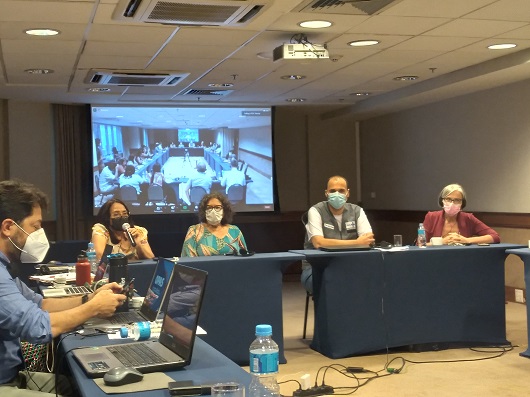Fiocruz participates in the construction of a health surveillance program on the borders
13/05/2022
ENSP Bulletin
The complex dynamic of public health on Brazil’s borders with other South American countries and with the French Overseas Department of French Guiana is a challenge that must be faced in an increasingly integrated way with the different players that make up the health systems in these areas, on both sides of the international frontier. It was in the attempt to improve this relationship and to plan joint actions that representatives of the government of the state of Amapá, the French Guiana, Fiocruz, the Pan American Health Organization (PAHO), the Brazilian and French Ministries of Health, and the Pasteur Institute of Guiana participated in the 3rd Transborder Workshop on Health Surveillance - Amapá/Brazil-French Guiana.
The complex dynamic of public health on the border was the workshop's theme (Image: Ascom Vigifronteiras)
The meeting took place at Fiocruz and culminated in the finalization of the construction of the last two axis of the program, which will be developed between 2022 and 2026: preparation of alerts and responses to emergencies in public health, and qualification and research. The remaining three - health surveillance, monitoring and alert; laboratory surveillance; and response to alerts - had already been defined in the first two workshops held in Oiapoque, in November 2021, and in Cayenne, the capital of French Guiana, in February this year.
The Transborder Program of Cooperation in Health Surveillance - Amapa/Brazil-French Guiana will have strategies, processes and workflows developed in a shared and integrated fashion by the institutions involved in the discussions. The long-term partnership with Fiocruz to offer training and carry out research projects in the border region between the state of Amapá and the French Guiana, associated to the beginning of the Educational Program for Health Surveillance in Border Areas (VigiFronteiras-Brasil), in 2021, turned the institution into a strategic asset for the Program.
“The richness of the event summarizes some of Fiocruz's core principles, such as increasing training opportunities and cooperation between countries, especially those that have borders with Brazil”, commented Cristina Guillan, Fiocruz’s Education General Coordinator. The Foundation is the main non-university training institution for the Unified Health System (SUS, the Brazilian public health system) and for Brazil’s Science, Technology and Innovation System.
For the advisor of the Superintendence of Health Surveillance of Amapá, Margarete Gomes, the workshop and the program are the result of a construction work that has been years in the making. “We are maturing how we collaborate and develop health solutions for the people who live in that region. I’m sure we’ll have a model to be followed by other border regions”, she stated. Gomes shares the same optimism of the general director of the French Guiana Regional Health Agency, Clara De Bort. “The program will demand a lot of work, but we’re on the right way, thanks to the commitment of the institutions involved”, she declared.
For Marcos Quito, PAHO representative, the program aims to develop ways to act with the same basic skills in border territories between the two countries. “Our goal has been to bring together SUS administrators and their tools and strategies to make sure they are better skilled to prepare and respond to public health events and emergencies”, he commented.
The project has been developed for at least five years. It was created initially as a research project, including the implementation of the Binational Center for Surveillance and Epidemiological Responses as an integral part of the Oiapoque Border Laboratory. “We left carrying such a level of synergy between the various agencies that they can transform the program into a public policy”, explained Dorinaldo Malafaia, former superintendent of Health Surveillance in Amapá.
“Regarding everything that has been done and planned in the region today, the result of a collaboration between the Center for Strategic Information in Health Surveillance (National CIEVS) of the Ministry of Health, the government of the state of Amapá, the government of Oiapoque and the other strategic players of the French Guiana, we see how this moment is significant and how much product and response it will generate for the health of the population in that region. We hope that having Fiocruz participating in the training of health workers will strengthen the health system in the region”, commented Pedro Dia, coordinator of National CIEVS.
“In this workshop, in particular, we attempt to understand the needs of local governments and teams in terms of training and qualification, to face the common challenged they meet on an everyday basis, and also to issue public health alerts that may occur”, explained Paulo Peiter, researcher in the field of border health for Fiocruz and one of the moderators of the workshop. He said the region faces great challenges regarding infrastructure and communication, which were made more evident by the COVID-19 pandemic.
The role played by each actor, work plan and resources necessary to make the Transborder Program of Cooperation in Health Surveillance - Amapa/Brazil-French Guiana operative are also being defined. Workgroups will continue to meet online over the upcoming months to wrap up the work.





